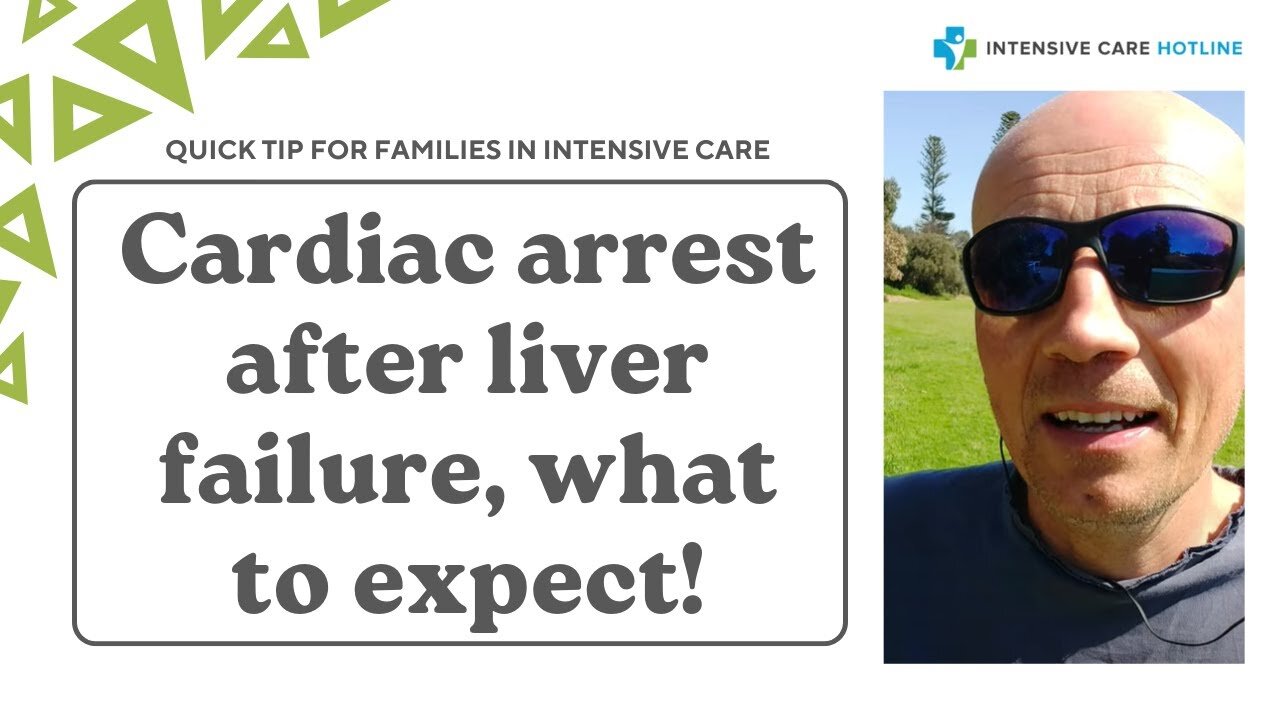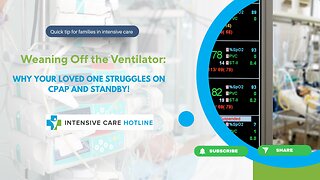Premium Only Content

Quick tip for families in Intensive Care: Cardiac arrest after liver failure, what to expect!
Quick tip for families in Intensive Care: Cardiac arrest after liver failure, what to expect!
Book your free 15 minute phone consultation here
http://intensivecarehotline.com/scheduling-appointment/
Call directly 24/7
+1 415-915-0090 USA/Canada
+44 118 324 3018 UK
+6141 094 2230 Australia
Email [email protected]
Get 1:1 consulting and advocacy
1:1 phone counselling
http://intensivecarehotline.com/one-on-one-counselling/
Become a member for families of critically ill Patients in Intensive Care
https://intensivecarehotline.com/intensivecaresupport-org-membership/
Immediate action steps http://intensivecarehotline.com/take-control-take-charge/immediate-action-steps/
https://intensivecareathome.com
And if you need a medical record review , click on the link and we can help you with reviewing your loved one’s medical records while they’re in ICU.
https://intensivecarehotline.thrivecart.com/review-of-medical-records/
Hi, it’s Patrik Hutzel from intensivecarehotline.com with another quick tip for families in intensive care. So, today’s tip is about, “Cardiac arrest after alcoholism and liver failure, what to expect in intensive care?”
So, we’re currently working with a client who’s having their 35-year-old brother in intensive care after cardiac arrest. He’s a heavy drinker, and he’s having some issues with alcohol, which probably led him to have cardiac arrest. But what’s happening now is, he went into ICU after cardiac arrest. He’s got some sort of hypoxic brain damage, but according to the doctors, it is something that they are worried about. But they also have hope that he will recover to a certain degree, which is obviously what the family wants.
Now, what else should you expect in a situation like that? He’s now day 17 on a ventilator with a breathing tube and with a nasogastric tube for feeding. And he’s having a pneumonia with atelectasis and he’s getting treatment for the pneumonia. Some of you may know, that the longer you are on a ventilator, the higher the chances are, you end up with a pneumonia just because there’s a term called ventilator-associated pneumonia, and that’s a high risk.
Next, he is still in an induced coma with Precedex, propofol and fentanyl because he’s on a breathing tube, obviously, that is very uncomfortable. The next step for him is to have a tracheostomy simply because he’s on high levels of support from the ventilator with a mandatory rate of 20 breaths per minute, with a PEEP (Positive End-Expiratory Pressure) of 12 and his breathing volumes of around 500 mls. And he’s not ready to be extubated yet. So, therefore, he will need a tracheostomy, which will be done in a couple of days, but they want to continue with the nasogastric tube. We don’t recommend a PEG (Percutaneous Endoscopic Gastrostomy) tube for a number of reasons, and especially for our audience in the U.S. Once you have a tracheostomy and a PEG, you are able to go to an LTAC and you don’t want to go to an LTAC. But I’m not going into detail about LTAC now, there are plenty of other videos about LTAC on my channel here.
Next, they now have done an ultrasound of the heart because they had a cardiac arrest and he has been on vasopressors a couple of days ago on some Levophed, but that’s now off, which is great. They’ve done an ultrasound of the heart. The ejection fraction is around 70%, which is really good, which means the heart is pretty intact.
Next, because he’s got liver failure, he’s also got ammonia in his brain, which makes the brain foggy and he’s on lactulose to get rid of the ammonia, so that he’s opening his bowels quite regularly, which is a lot of work, but that’s the only way really to deal with increased levels of ammonia.
Next, he’s now also on a heparin infusion because he’s got some clots in his liver and that’s why he’s on a heparin infusion, which is a high risk. On the one hand, the heparin is a blood thinner. On the other hand, especially with the looming tracheostomy, the heparin needs to be stopped prior to the tracheostomy and there needs to be restarted again. That’s certainly a bit of a risk there that when the heparin is stopped for the tracheostomy, that there will be some other clots forming. They probably would have to restart the heparin after the tracheostomy pretty quickly. And they have to monitor APTT (Activated Partial Thromboplastin Time) levels for the heparin infusion.
Continue reading at: https://intensivecarehotline.com/blog/quick-tip-for-families-in-intensive-care-cardiac-arrest-after-liver-failure-what-to-expect/
-
 12:10
12:10
Intensive Care Hotline
2 days agoWeaning Off the Ventilator: Why Your Loved One Struggles on CPAP and Standby!
81 -
 1:06:56
1:06:56
BonginoReport
10 hours agoThe Battle Between Good & Evil w/ Demonologist Rick Hansen - Hayley Caronia (Ep.168)
70.5K19 -
 1:12:57
1:12:57
Kim Iversen
4 hours agoBill Gates Suddenly Says “Don’t Worry About Climate Change”?
65.2K34 -
 1:05:12
1:05:12
Michael Franzese
4 hours agoI Waited 50 Years to Tell You What Happened on Halloween 1975
22.4K9 -
 1:07:15
1:07:15
Candace Show Podcast
4 hours agoINFILTRATION: Charlie Kirk Was Being Tracked For Years. | Candace Ep 256
60.2K226 -
 LIVE
LIVE
Rallied
4 hours ago $1.32 earnedWarzone Solo Challenges then RedSec Domination
145 watching -
 2:34:30
2:34:30
Red Pill News
6 hours agoBoomerang Time - DOJ Investigating BLM Fraud on Red Pill News Live
44.7K10 -
 1:46:14
1:46:14
Roseanne Barr
6 hours ago“The Over Emotional Are Always Under Informed” | The Roseanne Barr Podcast #121
81.6K44 -
 3:24:28
3:24:28
Nerdrotic
8 hours ago $10.92 earnedThe WitcHER DOA | Box Office Massacre | Massive Industry Layoffs - Friday Night Tights 378
47.6K8 -
 14:54
14:54
IsaacButterfield
16 hours ago $4.04 earnedShe Called Out “Creepy Men It Didn’t End Well
25K47